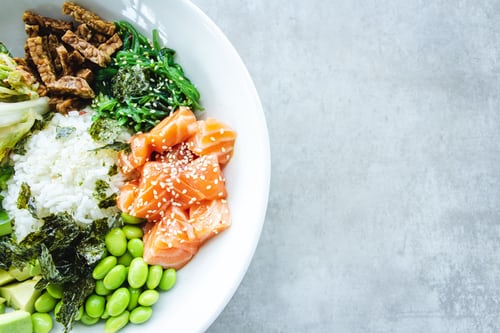In all sports, a specific and adapted diet is necessary to practice it well. A bad or unsuitable diet is never without consequences for the player or the practitioner. Marathon running, one of the great sports disciplines, requires a specific diet. What to eat? What to avoid? And how to eat when you are a marathon runner?
What food should you eat to succeed in a marathon?
To avoid less effective training, more difficult recovery, a decrease in physical capacity, an increase in the risk of injury and an increase in fatigue, all of which are energy deficits, a good diet is essential for any marathon runner. Firstly, good performance is the result of daily work and good daily nutrition.
During training, it is advisable to adopt a diet of 3 to 4 meals a day. This means breakfast, lunch, snack and dinner. The meals to be eaten during this period should contain 55 to 60% of the energy provided by carbohydrates and in particular complex carbohydrates such as bread, pasta, rice, semolina, lentils, kidney beans, white beans, etc. In addition, you should also eat foods rich in 25 to 30% of lipids which are of vegetable origin such as olive oil, walnut oil, rapeseed oil.
Proteins are very necessary to maintain sufficient muscle mass, a strong immune system and optimal body function. For this reason, 15% protein in food is highly recommended for a marathon runner during the training season. A portion of meat (125 g) or fish (125 g) or egg (2 units) at lunchtime and in the evening is the right benchmark. Red meat, which contains iron, a mineral essential for oxygenation and therefore for performance, should not be ignored.
One week or less before the competition, give preference to starchy foods! Starchy foods should be the mainstay of your diet. Your daily plate should contain 2/3 starchy foods and 1/3 green vegetables to ensure excellent nutrition for good performance.
Test food before consumption

It is not enough to take into account all of the above. But it is also important to test the food before consumption. This will show which foods are not good for the marathon runner’s body. This is to ensure that the body can handle the food. Hydration before, during and after the competition is one of the best ways.
Marathon: What kind of diet is needed to run it well ?
In all sports, a specific and adapted diet is necessary to practice it well. A bad or unsuitable diet is never without consequences for the player or the practitioner. Marathon running, one of the great sports disciplines, requires a specific diet. What to eat? What to avoid? And how to eat when you are a marathon runner?
What food should you eat to succeed in a marathon?
To avoid less effective training, more difficult recovery, a decrease in physical capacity, an increase in the risk of injury and an increase in fatigue, all of which are energy deficits, a good diet is essential for any marathon runner. Firstly, good performance is the result of daily work and good daily nutrition.
During training, it is advisable to adopt a diet of 3 to 4 meals a day. This means breakfast, lunch, snack and dinner. The meals to be eaten during this period should contain 55 to 60% of the energy provided by carbohydrates and in particular complex carbohydrates such as bread, pasta, rice, semolina, lentils, kidney beans, white beans, etc. In addition, you should also eat foods rich in 25 to 30% of lipids which are of vegetable origin such as olive oil, walnut oil, rapeseed oil.
Proteins are very necessary to maintain sufficient muscle mass, a strong immune system and optimal body function. For this reason, 15% protein in food is highly recommended for a marathon runner during the training season. A portion of meat (125 g) or fish (125 g) or egg (2 units) at lunchtime and in the evening is the right benchmark. Red meat, which contains iron, a mineral essential for oxygenation and therefore for performance, should not be ignored.
One week or less before the competition, give preference to starchy foods! Starchy foods should be the mainstay of your diet. Your daily plate should contain 2/3 starchy foods and 1/3 green vegetables to ensure excellent nutrition for good performance.
Test food before consumption
It is not enough to take into account all of the above. But it is also important to test the food before consumption. This will show which foods are not good for the marathon runner’s body. This is to ensure that the body can handle the food. Hydration before, during and after the competition is one of the best ways.
Most Popular
Creative handmade book box ideas for book subscription gifting
How to Style Military Tank Tops for a Modern Casual Look
Smart Shopping: Tricks for Dressing Well on a Budget
How to Choose the Best Kitchen Robot Options for Your Home
Categories
Related Posts
Creative handmade book box ideas for book subscription gifting
There's something wonderfully personal about presenting a book subscription gift, isn't there? Rather than simply handing over a voucher or
How to Style Military Tank Tops for a Modern Casual Look
Military tank tops have surged into the spotlight of contemporary fashion, blending rugged heritage with understated ease. These versatile pieces,
Smart Shopping: Tricks for Dressing Well on a Budget
Cultivating a wardrobe that exudes style and sophistication needn't drain your bank account. With a touch of ingenuity and a
How to Choose the Best Kitchen Robot Options for Your Home
Finding the perfect addition to your culinary toolkit has never been more exciting, as the world of smart kitchen appliances